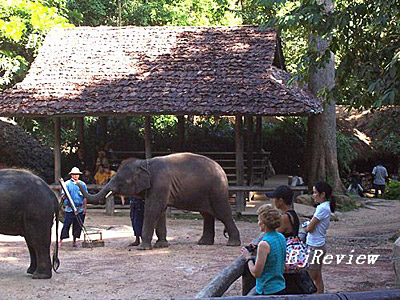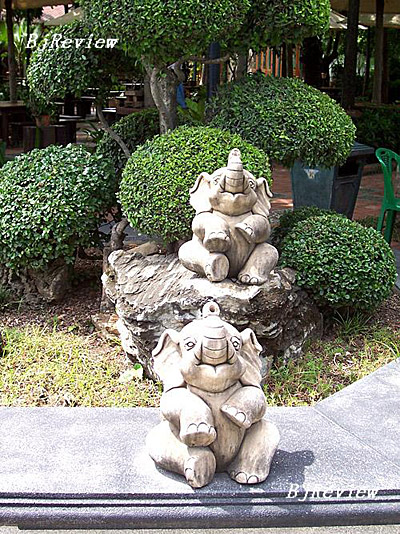| When I received a recent invitation to visit Thailand, I immediately thought of the lovely, helpful elephant in Bangkok. I recalled learning its story from an article entitled "Bangkok's Little Elephant" that I read in one of my primary school textbooks. The article told about a smart elephant that not only dragged a car out of the mud, but also cleaned the vehicle with water it had fetched with its long trunk. From then on, the very mention of Thailand has conjured up images of elephants for me.

We arrived at Bangkok at 9 p.m. Looking down from the plane, I saw neat streets lined by rosy lamps. As we traveled toward the city on a tour coach in heavy traffic, I found that colorful neon bulbs outlined many high buildings. Even at night, the city is ablaze with lights and teeming with activity.
With a population of more than 6 million, Bangkok is the largest city in Thailand and one of Southeast Asia's major economic and financial centers. It has everything that marks a modern metropolis-star-rated hotels, stylish shopping malls, imposing overpasses and traffic jams. It would be quite unusual to encounter an elephant on its bustling streets. But you can find lots of elephant sculptures and other souvenirs featuring the animal -- Thailand's national symbol -- in shops and roadside stalls.
The only place I saw real elephants in the Thai capital was at Siam Niramit. In this grand show of Thailand's history and cultural diversity, actors rode two elephants onto the stage. But I didn't have enough time to pose for a picture with them before leaving the theater.
It wasn't until two days later that we were able to take a closer look at Thai elephants. During our stay in Chiang Mai in the north, we visited the Measa Elephant Camp, some 20 minutes' drive from the city center. The camp, which flanks a rushing river in a lush tropical valley, is home to 78 elephants. When we arrived there in early morning, many black elephants, some with creamy white tusks, were enjoying their daily bath in the river.

In the Thai Buddhist culture, rare white elephants are believed to be sacred animals. Whenever a white elephant is captured, it must be presented to the king. In the Grand Palace in Bangkok, the former residence of the Thai king, there are sculptures of all the white elephants that have been found, each tagged with the date of its discovery and name of its finder.
In the past, elephants served as crucial weapons in north Thailand. Thai kings used to fight invaders from neighboring Myanmar on elephant back. Later, as warfare declined, elephants were employed to transport logs from the mountains. When the wood was exhausted, the elephants lost their jobs again. At last, the local people came up with a new idea to tap into their innate potential. They started to train the elephants to perform various stunts for tourists.
At Measa, we were amazed by the elephants’ stunning skills. They could not only play football, darts and the harmonica, but also paint incredibly wonderful pictures with their trunks. Little wonder then that Bangkok's little elephant accomplished the feat vividly depicted in the primary school textbook.
At the end of the Thailand tour, everybody in the group seemed to be obsessed by the animal as they rushed to purchase elephant sculptures, toys, ornaments and T-shirts. I was no exception. The elephant-pendant key chains I bought turned out to be popular gifts for my colleagues. | 